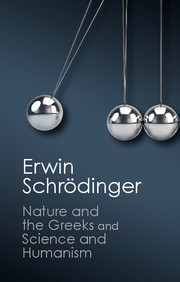Book contents
- Frontmatter
- Contents
- Foreword
- NATURE AND THE GREEKS
- SCIENCE AND HUMANISM
- Dedication
- Preface
- The spiritual bearing of science on life
- The practical achievements of science tending to obliterate its true import
- A radical change in our ideas of matter
- Form, not substance, the fundamental concept
- The nature of our ‘models’
- Continuous description and causality
- The intricacy of the continuum
- The makeshift of wave mechanics
- The alleged break-down of the barrier between subject and object
- Atoms or quanta-the counter-spell of old standing, to escape the intricacy of the continuum
- Would physical indeterminacy give free will a chance?
- The barto prediction, according to Niels Bohr
Would physical indeterminacy give free will a chance?
Published online by Cambridge University Press: 05 October 2014
- Frontmatter
- Contents
- Foreword
- NATURE AND THE GREEKS
- SCIENCE AND HUMANISM
- Dedication
- Preface
- The spiritual bearing of science on life
- The practical achievements of science tending to obliterate its true import
- A radical change in our ideas of matter
- Form, not substance, the fundamental concept
- The nature of our ‘models’
- Continuous description and causality
- The intricacy of the continuum
- The makeshift of wave mechanics
- The alleged break-down of the barrier between subject and object
- Atoms or quanta-the counter-spell of old standing, to escape the intricacy of the continuum
- Would physical indeterminacy give free will a chance?
- The barto prediction, according to Niels Bohr
Summary
On p. 12 I briefly touched upon that old crux, the apparent contradiction between the deterministic view about material events and what is called in Latin liberum arbitrium indifferentiae, in modern language free will. I suppose you all know what I mean: since my mental life is obviously bound up very closely with the physiological goings on in my body, more especially in my brain, then, if the latter are strictly and uniquely determined by physical and chemical natural laws, what about my inalienable feeling that I take decisions to act in this or that way, what about my feeling responsibility for the decision I actually do take? Is not everything I do mechanically determined in advance by the material state of affairs in my brain, including modifications caused by external bodies, and is not my feeling of liberty and responsibility deceptive?
This does strike us as a true aporia, which occurred for the first time to Democritus, who realised it fully—but left it alone; very wisely, I think. He fully realised it. While he adhered to his ‘atoms and the void’ as the only reasonable way of understanding objective nature, we have some definite utterances of his preserved, to the effect that he also realised that this whole picture of the atoms and the void was formed by the human mind on the evidence of sense perceptions, and nothing else; and other utterances where he states, almost in the words of Kant, that we know nothing about what any thing really is in itself, the ultimate truth remaining deeply in the dark.
- Type
- Chapter
- Information
- 'Nature and the Greeks' and 'Science and Humanism' , pp. 162 - 168Publisher: Cambridge University PressPrint publication year: 2014



